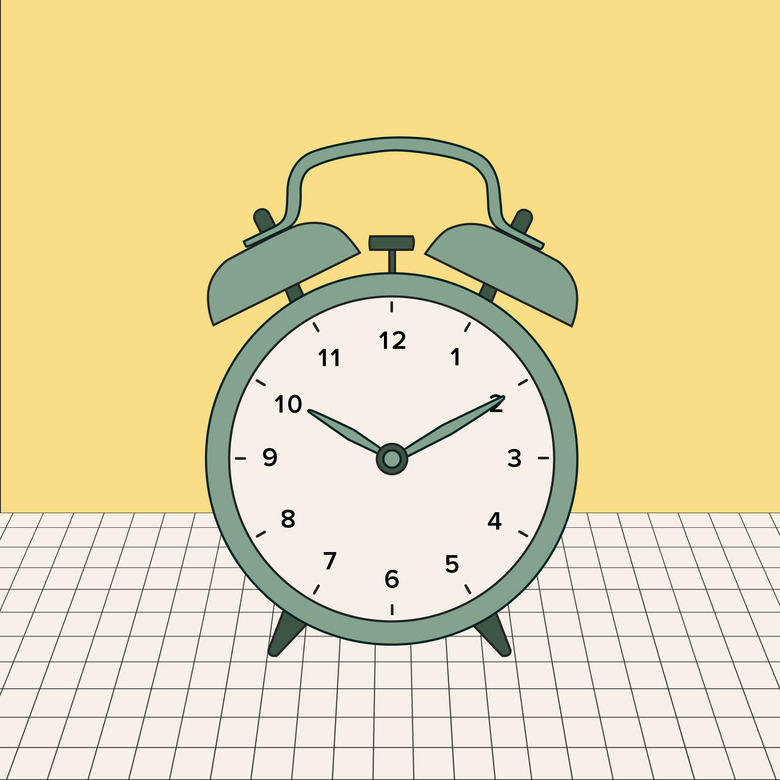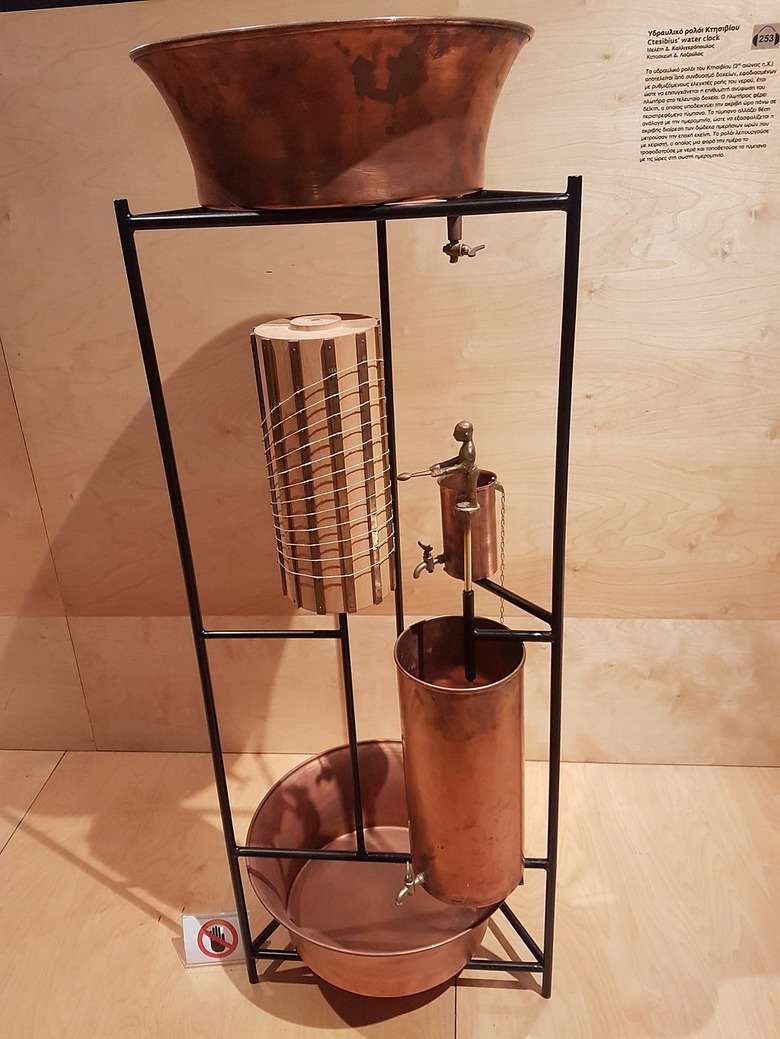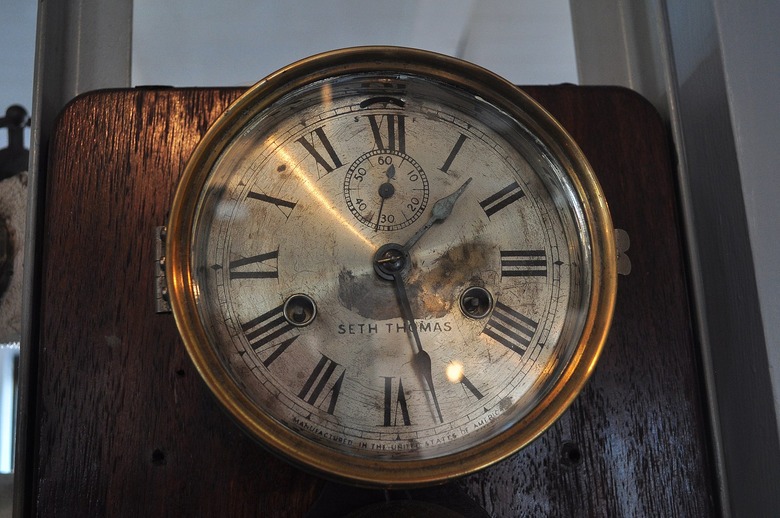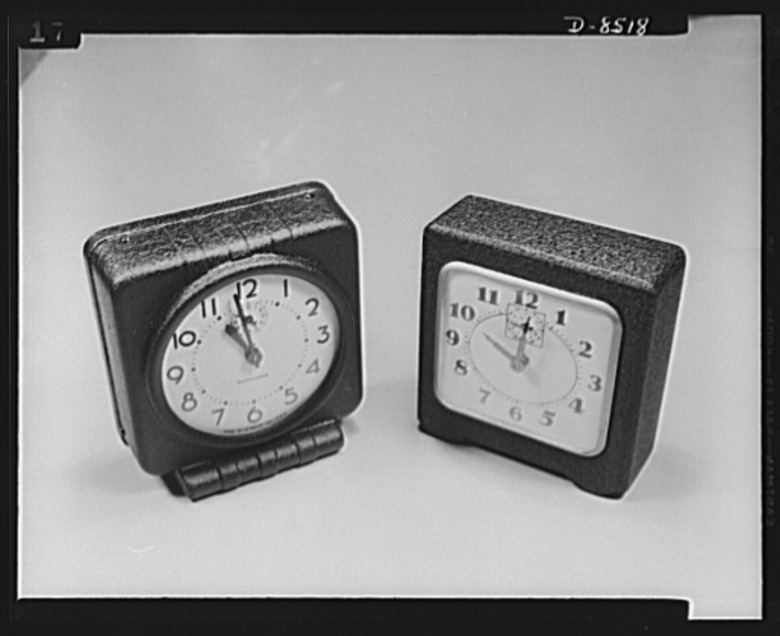The Evolution Of The Modern Alarm Clock Started With Plato
The alarm clock is a household item known for cultivating love-hate relationships. While they do help us get up on time, they also produce one of the most annoying sounds known to humankind. Yet, it's not the alarm clock's fault — instead, we should be side-eyeing the inventors of the device.
Who invented the alarm clock?
Who invented the alarm clock?
One of the earliest known alarm clocks was invented by Greek philosopher Plato during the 4th century B.C. According to author James M. Russell's Plato's Alarm Clock: And Other Amazing Ancient Inventions, Plato added an "alarm" to a water clock — which had been around since the 16th century B.C. — to ensure that he and his students got up in time for lessons. The device consisted of a tube filled with water that siphoned into a lower receptacle. The latter featured small holes that whistled, acting as an alarm when the water pushed air through them.
In 2015's The Handy Technology Answer Book, authors Naomi Balaban and James Bobick state that in 250 B.C., the Greeks were using a water alarm clock that utilized a gear system and a bell. In the 2019 article "The Development of Clocks and Watches Over Time," ThoughtCo. writer Mary Bellis adds that in 250 B.C., Greeks were also using a "clepsydra," which is a water clock that used rising waters to keep time and eventually hit a mechanical bird that would trigger an alarm. Though this device was certainly handy (and unique), it wasn't exactly known for its accuracy.
Almost a thousand years later, engineer Yi Xing would be asked to enhance China's calendars and, in the process, would end up creating his own version of an alarm clock. According to Atlas Obscura, Xing created an astronomical clock with a water wheel that turned gears in the clock, allowing puppet shows and gongs to play at certain times. This was in the year 725.
Some historians posit that personal mechanical alarm clocks were made by unknown German inventors during the 15th century. However, those who didn't have (or couldn't afford) an alarm clock would use other means to get themselves up on time.
Other types of alarm clocks throughout history:
Other types of alarm clocks throughout history:
Sasha Handley, an early modern history lecturer at the University of Manchester, told Live Science, "For a society that was overwhelmingly [agricultural] before the Industrial Revolution, noises of nature were probably really important things." She specifically mentions the sounds of roosters crowing and cows mooing, and even says that many would rely on church bells as a type of public alarm clock.
The first known mechanical alarm clock, per Balaban and Bobick, was designed by New Hampshire clockmaker Levi Hutchins. In 1787, he built an alarm clock that only rang at 4 a.m. Why? Author Gina Misiroglu's The Handy Answer Book for Kids (and Parents) says that it was because Hutchins had a "firm rule" to never awaken past that time — if he did, his entire day would be ruined. Unfortunately, he never patented or manufactured this alarm clock (though we're not sure how many people would want to wake up at 4 a.m. every single day).
Who invented the first adjustable alarm clock?
Who invented the first adjustable alarm clock?
As for the first adjustable alarm clock, The Handy Technology Answer Book reveals that it was invented by Frenchman Antoine Redier in 1847. However, his patent didn't apply in the United States, so American Seth E. Thomas was able to patent his own version in 1876. It was a wind-up mechanical alarm clock that would later be mass-produced by Thomas's own company, the Seth Thomas Clock Company.
Though alarm clocks did exist during the Industrial Revolution, not everyone was keen on using (or able to afford) them. The BBC writes that until the 1970s, in certain areas, many British and Irish workers chose to be woken up by a "knocker-upper." This was a person who would tap at customers' windows with a long pole to wake them. Some would even use peashooters to get the job done, being careful not to also wake up neighbors who didn't pay for their services.
When did alarm clocks become popular?
When did alarm clocks become popular?
The knocker-upper started to disappear beginning in the 1920s because this was when alarm clocks gained traction. When it comes to the stereotypical alarm clock with double bells, history major and buff Shahan Cheong writes, on his blog Throughout History, that it was likely invented between the 1880s and 1890s. "It has been manufactured by Westclox since at least the 1920s," he states, referring to the Westclox clock and alarm clock company that has been around since 1885. They produced the "Big Ben" clock in the early 1900s, which is famous for its clean appearance and bell-back design featuring a bell that was built into the back of the clock.
The alarm clock trend was short-lived, however, because World War II had almost all factories focusing on wartime production. Some alarm clocks were permitted to be manufactured so that workers could wake up on time, but since metal was also scarce, these particular clocks were made of an egg carton-like material.
When demand for alarm clocks began to increase, the War Production Board permitted certain factories to return to their original business as early as 1944. One such clock that came about at this time was the Westclox Waralarm, which caused a near-riot in a Chicago store because people were so desperate to get their hands on a wartime alarm clock. (This is according to the Westclox Museum in Illinois.)
Who invented the clock-radio?
Who invented the clock-radio?
If you're wondering about the first clock-radio, Time writer Peter Ha states that it was likely invented by James F. Reynolds and Paul L. Schroth Sr. in the 1940s. Then, in the mid-1960s, Cheong writes that the first electronic digital clock came about. Goodbye, cardboard clocks!
Most importantly, who do we have to thank for the snooze button? Though many believe it was Ben-Hur author Lew Wallace, Russo reveals that the Lew Wallace Museum squashed this idea. This is because the author died in 1905, which is 51 years before General Electric-Telechron released the first alarm clock with a snooze button. As for a specific person to thank, unfortunately, that information is not available.
Nowadays, we have alarm clocks that simulate the sunrise, project the time, and even alarm clocks that roll away and require you to catch them, but most of us likely use the customizable alarm clocks that are built into our smartphones. Yes, all alarm clocks may be bothersome — but at least they're not cows who won't stop mooing or roosters that may never stop cock-a-doodle-doo-ing. Now that's perspective.



